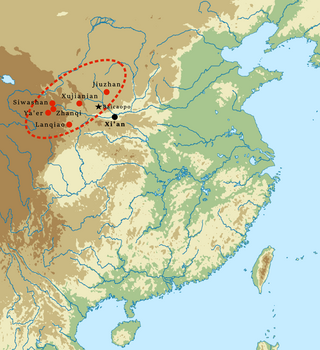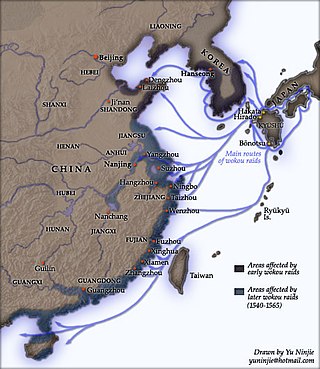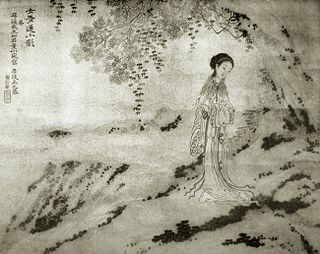Related Research Articles

The Tujia (Northern Tujia: Bifjixkhar / Bifzixkar, IPA:, Southern Tujia: Mongrzzir, ; Chinese: 土家族; pinyin: Tǔjiāzú; Wade–Giles: Tu3-chia1-tsu2) are an ethnic group and, with a total population of over 8 million, the eighth-largest officially recognized ethnic minority in the People's Republic of China. They live in the Wuling Mountains, straddling the common borders of Hunan, Hubei and Guizhou Provinces and Chongqing Municipality.
The Hani language is a language of the Loloish (Yi) branch of the Tibeto-Burman linguistic group spoken in China, Laos, Myanmar, and Vietnam by the Hani people.
The Shiqi dialect is a dialect of Yue Chinese. It is spoken by roughly 160,000 people in Zhongshan, Guangdong's Shiqi urban district. It differs slightly from Standard Cantonese, mainly in its pronunciation and lexicon.
"Blood-stained Glory" is a Chinese patriotic military song written in 1986, originally used to commemorate those who died during the Sino-Vietnamese War. Many singers have covered the song, including Peng Liyuan, Dong Wenhua and Anita Mui.

Jinshui District is one of 6 urban districts of the prefecture-level city of Zhengzhou, the capital of Henan Province, South Central China. The District is 135.3 square km, in which the urban area is 70.65 square km. The total population is 1.4 million.
The Grand Secretariat was nominally a coordinating agency but de facto the highest institution in the imperial government of the Chinese Ming dynasty. It first took shape after the Hongwu Emperor abolished the office of Chancellor in 1380 and gradually evolved into an effective coordinating organ superimposed on the Six Ministries. There were altogether six Grand Secretaries, though the posts were not always filled. The most senior one was popularly called Senior Grand Secretary. The Grand Secretaries were nominally ranked as mid-level officials, ranked much lower than the Ministers, heads of the Ministries. However, since they screened documents submitted to the emperor from all governmental agencies, and had the power of drafting suggested rescripts for the emperor, generally known as piàonǐ (票擬) or tiáozhǐ (條旨), some senior Grand Secretaries were able to dominate the whole government, acting as de facto Chancellor. The word nèigé itself also became to refer modern cabinet in Chinese.
"The Story of Spring" is a patriotic Chinese song praising Chinese leader Deng Xiaoping, although it never mentions him by name. Originally sung by famous Chinese folk singer Dong Wenhua, Deng is referred to as "an old man" throughout the song. Its two verses allude to Deng's economic reform policies and their success from its inception in spring 1978 to his southern tour in spring 1992, when the song was created.
The Wenhua Film Company was a Chinese major privately owned film production company headquartered in Shanghai, China. It was founded in 1946 and defunct in 1952 of the immediate post-war period in China.

East Lake is a large freshwater lake within the city limits of Wuhan, China, the largest or the second largest urban lake in China. Wuhan's East Lake covers an area of 88 square kilometers. It is one of the 5A tourist zones of China, and admits over a million people yearly. It is one of the largest sites in Huazhong District. It is also the largest "City Lake" in China. East Lake is made of four areas, Ting Tao, Moshan, Luo Yan Island and Museum of Hubei Province.

The Minjiang dialect is a branch of Sichuanese, spoken mainly in the Min River (Mínjiāng) valley or along the Yangtze in the southern and western parts of the Sichuan Basin in China. There is also a language island of the Minjiang dialect located in the center of the Sichuan Basin covering several counties, including all of Xichong, Yanting, and Shehong Counties, and part of Jiange, Cangxi, Nanbu, Langzhong and Bazhong. The Minjiang dialect is also referred to as the Nanlu dialect by some scholars.

Kayue culture was a Bronze Age culture in Northwest China in the area of the upper reaches of the Yellow River and its tributary Huang Shui. It was discovered in 1923 in the villages Kayue (卡约) and Xiaxihe (下西河) of Yunguchuan Huangzhong in China's Qinghai Province and is named after the village of Kayue. The former name of the Kayue culture was Kayao culture, it was previously assigned to the Siwa culture. It is dated to the period of approximately 900 to 600 BCE.

The Siwa culture was a Bronze Age culture in southeast Gansu Province, China. It was discovered by Swedish geologist Johan Gunnar Andersson in 1924 at Mount Siwa (寺洼山) in Lintao County, hence its name. It flourished circa 14th to 11th century BC, it is tentatively attributed to the cultures of the Northern Di, Qiang, and Xunyu peoples.
Wenhua may refer to:

Zhongshan District is a district in Keelung, Taiwan.

The Jiajing wokou raids caused extensive damage to the coast of China in the 16th century, during the reign of the Jiajing Emperor in the Ming dynasty. The term "wokou" originally referred to Japanese pirates who crossed the sea and raided Korea and China; however, by the mid-Ming, the wokou consisted of multinational crewmen that included the Japanese and the Portuguese, but a great majority of them were Chinese instead. Mid-Ming wokou activity began to pose a serious problem in the 1540s, reached its peak in 1555, and subsided by 1567, with the extent of the destruction spreading across the coastal regions of Jiangnan, Zhejiang, Fujian, and Guangdong.

The Dadong Arts Center is an art center in Fengshan District, Kaohsiung, Taiwan.
Khabi, also rendered Kabie, is a Southern Loloish language of Yunnan, China. Kabie is spoken in Jiangcheng Hani and Yi Autonomous County, Mojiang Hani Autonomous County, and Lüchun County.

Hu Zongxian, courtesy name Ruzhen (汝貞) and art name Meilin (梅林), was a Chinese general and politician of the Ming dynasty who presided over the government's response to the wokou pirate raids during the reign of the Jiajing Emperor. As supreme commander, he was able to defeat Xu Hai's (徐海) substantial raid in 1556 and capture the pirate lord Wang Zhi the next year through ruses. Despite his accomplishments, Hu Zongxian's reputation had been tarnished by his association with the clique of Yan Song and Zhao Wenhua, traditionally reviled figures in Ming historiography. He was rehabilitated decades after his death and was given the posthumous name Xiangmao (襄懋) by the emperor in 1595.

Dong Xiaowan (1624–1651), also known as Dong Bai, was a Chinese Yiji, poet and writer, also known by her pen name Qinglian.
Xituanshan is a Late Bronze Age group of stone burials in Jilin, China. It was designated a Major National Historical and Cultural Site by the Chinese government in 2001.
References
- ↑ Fang, Liu (17 April 2007). "Dong Wenhua with other Chinese musicians sweeps New York". CCTV International . Retrieved 17 August 2010.